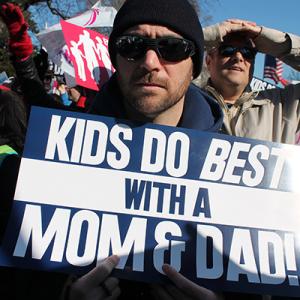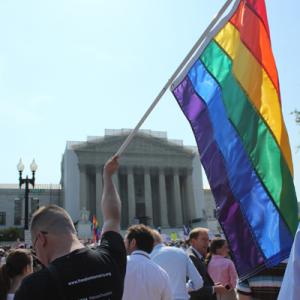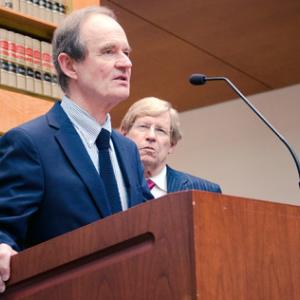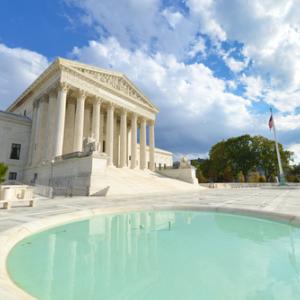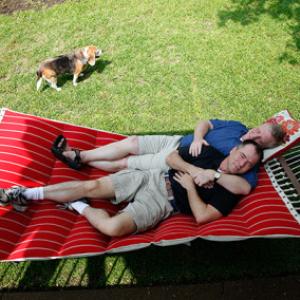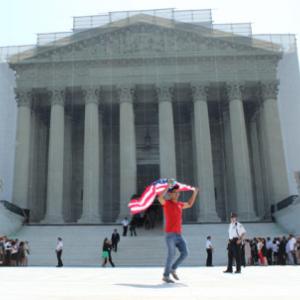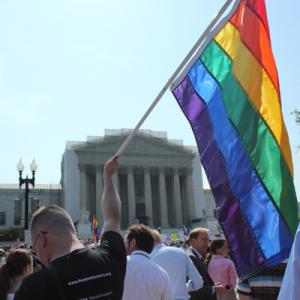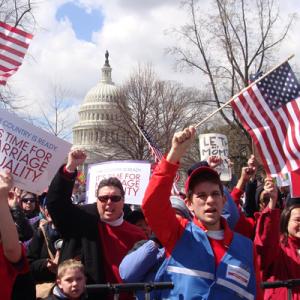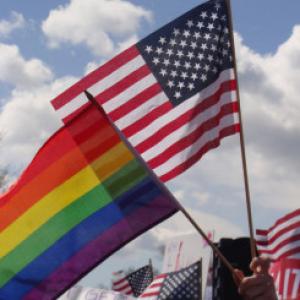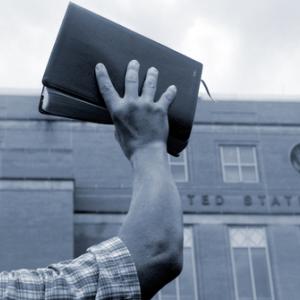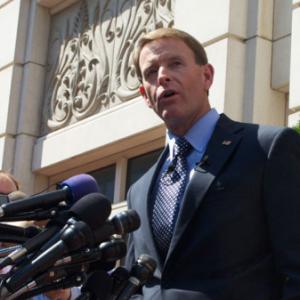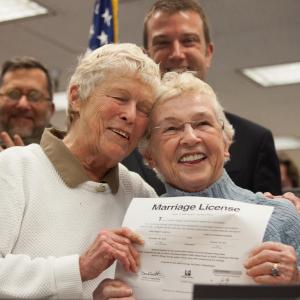Richard Wolf writes for USA Today.
Posts By This Author
Gay Marriage Hits Major Bump in Federal Appeals Court
The same-sex marriage movement lost its first major case in a federal appeals court Thursday after a lengthy string of victories, creating a split among the nation’s circuit courts that virtually guarantees review by the U.S. Supreme Court.
The 2-1 ruling from the Cincinnati-based 6th U.S. Circuit Court of Appeals reversed lower court rulings that had struck down gay marriage bans in Michigan, Ohio, Kentucky and Tennessee.
More important, it gives Supreme Court justices an appellate ruling that runs counter to four others from the 4th, 7th, 9th and 10th circuits. Those rulings struck down same-sex marriage bans in Virginia, Indiana, Wisconsin, Oklahoma, Utah, Idaho and Nevada, leading to similar action in neighboring states.
Circuit Judge Jeffrey Sutton, one of the Republican Party’s most esteemed legal thinkers and writers, issued the 42-page decision precisely three months after hearing oral arguments in the cases, with fellow GOP nominee Deborah Cook concurring. He delivered a rare defeat for proponents of same-sex marriage, who had won nearly all the cases decided from Florida to Alaska since the Supreme Court ruled against the federal Defense of Marriage Act in June 2013.
Sutton argued that appellate judges’ hands are tied by a one-sentence Supreme Court ruling from 1972, which “upheld the
right of the people of a state to define marriage as they see it.” Last year’s high court decision requiring the federal government to recognize legal same-sex marriages does not negate the earlier ruling as it applies to states where gay marriage is not legal, he said.
Justices to Take Up Abercrombie & Fitch Headscarf Case
The Supreme Court granted 11 new cases for review Oct. 2, agreeing to rule on controversial topics such as religious freedom, child abuse, immigration, housing discrimination, congressional redistricting and campaign fund-raising by judicial candidates.
While they delayed any decision on same-sex marriage, the justices filled out their docket through January and into February with civil rights cases and others likely to command attention.
Here’s a look at what the justices chose from among some 2,000 cases that accumulated through the summer:
Gay Marriage Supporters’ String of Court Victories Broken in Louisiana
The legal winning streak for same-sex marriage is over.
A federal judge in Louisiana upheld that state’s prohibition on gay marriage on Sept. 3, and belittled a string of 20-plus federal court decisions striking down state bans as “a pageant of empathy.”
It was the first time since the Supreme Court ruled against the federal Defense of Marriage Act in June 2013 that a federal court refused to throw out a state’s ban on gay and lesbian marriages.
A promised appeal, like Texas’ appeal of a district judge’s ruling in favor of gay marriage there, now goes to the U.S. Court of Appeals for the 5th Circuit, perhaps the nation’s most conservative appellate court.
The ruling came from District Judge Martin Feldman, 80, who was named to the federal bench by President Ronald Reagan more than 30 years ago. Feldman echoed the two judges — both in their 70s and appointed by President George H.W. Bush — who dissented from recent rulings against Utah, Oklahoma and Virginia gay marriage bans in the 10th and 4th Circuits.
Appeals Court Ruling Clears Way for Gay Marriage in the Heart of Bible Belt
A federal appeals court panel in Virginia became the second one this summer to strike down a state ban against same-sex marriage Monday, making it more likely that the Supreme Court will settle the issue as early as next year.
“We recognize that same-sex marriage makes some people deeply uncomfortable,” said Judge Henry Floyd, originally appointed a district judge by George W. Bush and elevated to the circuit court by President Obama. “However, inertia and apprehension are not legitimate bases for denying same-sex couples due process and equal protection of the laws.”
The circuit court has jurisdiction over Virginia, Maryland, West Virginia, North Carolina and South Carolina. The panel’s decision will not take effect until at least Aug. 18 while circuit clerks defending the state’s ban decide whether to appeal to the full appellate court or the Supreme Court.
Like the first appeals court panel to rule on the issue this year in Utah and Oklahoma, the three-judge panel was deeply divided.
Wheaton College Gets a Pass from Supreme Court on Contraception Mandate
The Supreme Court offered a further sign that it favors letting employers with religious objections avoid the Obama administration’s so-called contraception mandate.
Over the vehement objection of its three female justices, the court late Thursday blocked the administration from forcing evangelical Wheaton College to sanction insurance coverage for emergency birth control, even though it would not have had to offer the coverage itself.
In doing so, the court made clear that it’s not done with the religious liberty issue following the court’s June 30 ruling that closely-held, for-profit corporations with objections to certain contraception methods do not have to offer this type of coverage to their employees.
In Heart of Texas, Support Grows for Same-sex Marriage
GUN BARREL CITY, Texas (RNS) This place got its name because the main road was straight as a gun barrel. Today, it’s at the center of a fight over gay marriage.
That’s because weekenders Mark Phariss and Vic Holmes, who bought an A-frame house overlooking scenic Cedar Creek Lake four years ago, have become minor celebrities as the men challenging Texas’ ban on same-sex marriage.
Their battle, joined by two women whose Massachusetts marriage the Lone Star State refuses to recognize, is as unlikely as it is uphill. They’ve already won the first round in federal court in San Antonio, where District Judge Orlando Garcia ruled the state’s marriage laws against gay couples “demean their dignity for no legitimate reason.”
Justices May Decide if Photographers can Snub Gay Weddings
When Vanessa Willock wanted an Albuquerque photographer to shoot her same-sex commitment ceremony in 2006, she contacted Elane Photography. The response came as a shock: Co-owner Elaine Huguenin said she only worked on “traditional weddings.”
“Yes, you are correct in saying we do not photograph same-sex weddings,” Huguenin responded.
Now 7 1/2 years after that e-mail exchange, the Supreme Court is considering whether to referee the dispute.
Religious Liberty vs. Civil Rights: A Balancing Act
Arizona Gov. Jan Brewer may have ended the latest controversy in her state by vetoing a “religious freedom” bill that threatened gay men and lesbians, but the nation’s legislatures and courts are just getting started.
While religious liberty remains a “core value” in Arizona, Brewer said Wednesday, “so is non-discrimination.” And therein lies the balancing act that’s at the root of several other disputes.
The answer isn’t simple. Congress and the states often carve out exceptions for religious beliefs. The Supreme Court has consistently made room for religious exercise. And unlike race and gender, sexual orientation is not a protected class — yet.
Supreme Court Poised to Turn Right in 2013 Term
After two blockbuster terms in which it saved President Obama’s health care law and advanced the cause of same-sex marriage, the Supreme Court appears poised to tack to the right in its upcoming term on a range of social issues, from abortion and contraception to race and prayer.
The justices, whose term begins Monday, could rule against racial minorities in two cases and abortion rights in one or two others. They also could uphold prayers at government meetings, ease restrictions on wealthy political donors, strike down federal environmental regulations, and take a first bite out of Obamacare.
Gay Marriage Fight Shifts to the States
The legal battle over same-sex marriage has shifted from the Supreme Court to state capitals and lower courts as supporters seek to build on their recent victories and opponents hope to thwart that progress.
Armed with Justice Anthony Kennedy’s decision striking down the Defense of Marriage Act, lawyers representing same-sex couples filed a lawsuit in Pennsylvania on Tuesday, and vowed to follow with others in North Carolina and Virginia.
Those cases will be added to at least 11 pending from New Jersey to Hawaii.
Supreme Court Marriage Rulings: Anything But Simple
If the range of possible Supreme Court rulings on gay marriage this month requires a scorecard, the potential confusion arising from those decisions may demand a manual.
It’s not as simple as whether gays and lesbians can marry, and whether they become eligible for federal benefits. The two decisions are likely to create new questions for couples in civil unions and those who move between states, as well as for employers.
As a result, what’s already a complex situation for many gay and lesbian couples could get more complicated, at least initially, said John Culhane, a law professor at Widener University’s Delaware campus and co-author of Same-Sex Legal Kit for Dummies.
What Will the Supreme Court Do on Gay Marriage?
Houston lawyer Mitchell Katine came to the Supreme Court 10 years ago for the final chapter of Lawrence v. Texas, the landmark gay rights case in which the justices struck down state sodomy laws.
Neither Katine nor the other lawyers working for John Lawrence and Tyron Garner in their battle against Texas’ sodomy law imagined the length and breadth of Justice Anthony Kennedy’s majority decision, which struck down all remaining state sodomy laws.
As the Supreme Court prepares to issue two historic decisions on gay marriage this month, however, the judges and lawyers who worked on both sides of those earlier cases don’t expect anything quite so eloquent or all-encompassing from a cautious and conservative court.
Supreme Court to Hear Case on Prayer at Government Meetings
The Supreme Court agreed Monday to consider whether prayers can be offered at government meetings — a practice that’s been common in Congress and throughout the states for more than two centuries.
The religious expression case, which comes to the court from the town of Greece, N.Y., focuses on the first 10 words of the First Amendment, ratified in 1791: “Congress shall make no law respecting an establishment of religion.”
That Establishment Clause was violated, the 2nd U.S. Circuit Court of Appeals ruled last year, when the Greece Town Board repeatedly used Christian clergy to conduct prayers at the start of its public meetings. The decision created a rift with other appeals courts that have upheld prayer at public meetings, prompting the justices to step in.
Opponents of Gay Marriage Say They’re No Bigots
They are moms and dads, authors and activists, a former police officer and a former single mom. They’re black and white and Hispanic. One’s a Roman Catholic archbishop, another an evangelical minister. Many have large families — including gay members.
They are among the leading opponents of gay marriage, or as they prefer to be called, defenders of traditional marriage. And they’re trying to stop an increasingly popular movement as it approaches two dates with history this week at the Supreme Court.
Gay Marriage Opponents Make Their Case to Supreme Court
WASHINGTON — Foes of same-sex marriage are warning the Supreme Court that lifting state or federal restrictions would threaten their own economic and religious freedoms and lead to social and political upheaval.
In about three dozen briefs filed in recent weeks, groups ranging from U.S. Catholic bishops and evangelicals to state attorneys general and university professors argue that upholding gay marriage could lead to penalties against objecting employers, military officials, and others.
Briefs from supporters of gay marriage are due by early March.
Both Sides Brace for Supreme Court Battle on Gay Marriage
WASHINGTON — The Supreme Court's decision to take up the explosive issue of same-sex marriage will thrust the high court into a policy debate that has divided federal and state governments and courts, as well as voters in nearly 40 states.
The court's agreement to hear challenges to the federal Defense of Marriage Act and California's Proposition 8 ban on same-sex marriage moves the issue to the top of the national agenda following a year in which advocates scored major legal and political victories.
The court likely will hear the cases in March and rule by late June on a series of questions, potentially including one of the most basic: Can states ban gay marriage, or does the Constitution protect that right for all couples? It also will decide whether gay and lesbian married couples can be denied federal benefits received by opposite-sex spouses.
Any decisions will make history on an issue that has divided the nation for decades. Nine states and the District of Columbia now permit same-sex marriages, and a decision against California's Prop 8 ban would add the 10th and largest state.
A ruling against the 1996 federal law could lead to a spike in gay marriages in all those states. Several more states are likely to consider allowing same-sex marriages in 2013.
